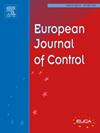基于同步积分强化学习的输入饱和时滞非线性多智能体系统最优共识控制
IF 2.6
3区 计算机科学
Q2 AUTOMATION & CONTROL SYSTEMS
引用次数: 0
摘要
研究了基于同步积分强化学习(IRL)的具有输入饱和和输入延迟的非线性多智能体系统(MASs)的最优一致控制问题。首先采用模型约简方法将原系统转化为无延迟模型,然后引入新的性能指标函数,在此基础上建立两个质量系统性能指标之间的等价关系。通过这种等价性,可以成功地将具有输入延迟的MAS的OCC问题转化为无延迟MAS的OCC问题。其次,建立了具有非二次函数的Hamilton-Jacobi-Bellman (HJB)方程。进一步证明了这些耦合HJB方程的解不仅是最优控制策略,而且构成纳什均衡。第三,利用在线同步IRL算法设计最优控制器,构建actor-critic (A-C)神经网络(NNs)结构分别逼近控制策略和值函数。两个神经网络的权值同步更新。最后,通过仿真实例验证了该方法的有效性。本文章由计算机程序翻译,如有差异,请以英文原文为准。
Optimal consensus control for input-delay nonlinear multi-agent systems with input saturation utilizing synchronous integral reinforcement learning
This paper addresses the optimal consensus control (OCC) problem for nonlinear multi-agent systems (MASs) with input saturation and input delay based on synchronous integral reinforcement learning (IRL). First, the model reduction method is employed to convert the original system into a delay-free model, subsequently, the new performance index functions are introduced, based on which an equivalence relationship is established between the performance indices of two MASs. Through this equivalence, the challenging problem of OCC for MAS with input delays can be successfully transformed into that of delay-free MAS. Second, the Hamilton–Jacobi–Bellman (HJB) equations with non-quadratic functions are established. It is further demonstrated that the solutions to these coupled HJB equations not only are optimal control policies but also constitute Nash equilibrium. Third, the online synchronized IRL algorithm is utilized to design the optimal controllers, constructing actor–critic (A–C) neural networks (NNs) structure to approximate the control policies and value function, respectively. The weights of both NNs are updated synchronously. Finally, the simulation example shows the effectiveness of the method.
求助全文
通过发布文献求助,成功后即可免费获取论文全文。
去求助
来源期刊

European Journal of Control
工程技术-自动化与控制系统
CiteScore
5.80
自引率
5.90%
发文量
131
审稿时长
1 months
期刊介绍:
The European Control Association (EUCA) has among its objectives to promote the development of the discipline. Apart from the European Control Conferences, the European Journal of Control is the Association''s main channel for the dissemination of important contributions in the field.
The aim of the Journal is to publish high quality papers on the theory and practice of control and systems engineering.
The scope of the Journal will be wide and cover all aspects of the discipline including methodologies, techniques and applications.
Research in control and systems engineering is necessary to develop new concepts and tools which enhance our understanding and improve our ability to design and implement high performance control systems. Submitted papers should stress the practical motivations and relevance of their results.
The design and implementation of a successful control system requires the use of a range of techniques:
Modelling
Robustness Analysis
Identification
Optimization
Control Law Design
Numerical analysis
Fault Detection, and so on.
 求助内容:
求助内容: 应助结果提醒方式:
应助结果提醒方式:


